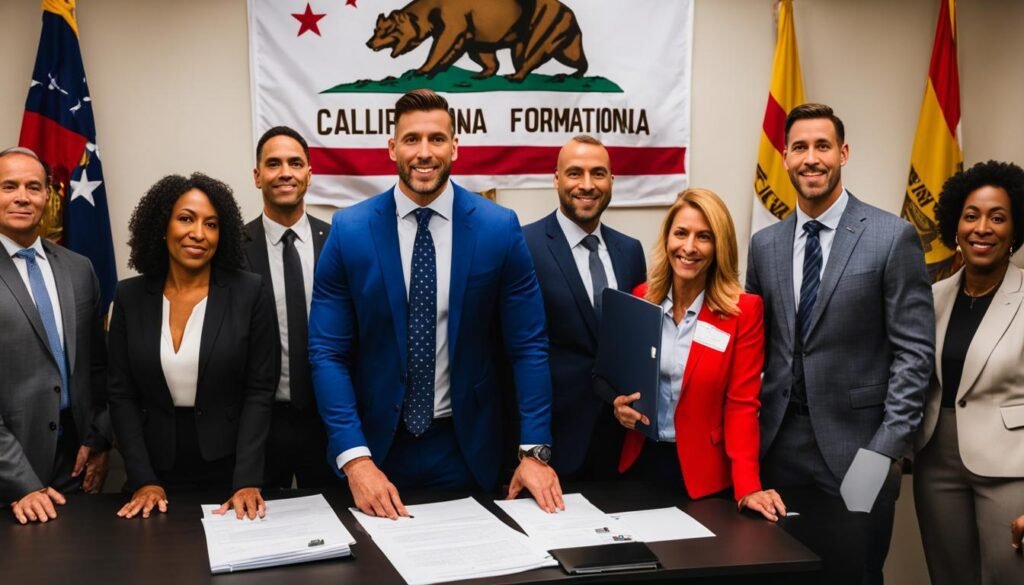Greetings! If you’re considering starting a business in California, forming a limited liability company (LLC) could be the perfect choice. With its thriving business environment and countless opportunities, California has become a hub for entrepreneurs. Starting an LLC in California offers several benefits, including flexibility, legal protection, and tax advantages.
In this article, I will guide you through the step-by-step process of starting your own LLC in California. Whether you’re a seasoned entrepreneur or new to the business world, this guide will provide you with all the information you need to navigate the LLC formation process with ease.
Key Takeaways:
- LLCs offer flexibility, legal protection, and tax advantages for businesses in California.
- Starting an LLC in California involves a step-by-step process.
- Choosing a unique name and appointing a registered agent are essential steps in forming an LLC.
- Obtaining necessary permits and filing the articles of organization with the California Secretary of State are crucial for compliance.
- By following this guide, you can confidently start your own LLC in California and unlock new business opportunities.
Steps to Form an LLC in California
To form an LLC in California, you need to follow a series of steps. Here’s a comprehensive guide to help you get started:
- Choose a Unique Name: Select a name for your LLC that complies with California state regulations. Your chosen name should be unique and not cause confusion with other businesses.
- Appoint a Registered Agent: Designate a registered agent who will receive legal and official documents on behalf of your LLC. The registered agent must meet the requirements of being a California resident with a physical address in the state.
- Obtain Business Permits: Depending on your industry and location, you may need to obtain specific business licenses and permits to operate your LLC legally. Ensure compliance with California’s requirements for different professions.
- File Articles of Organization: Submit the articles of organization to the California Secretary of State. This filing includes providing essential information about your LLC, including its name, address, registered agent, and management structure.
- Create an LLC Operating Agreement: Draft an LLC operating agreement that outlines the internal operations and financial arrangements of your LLC. While not required by law, it’s a vital document for establishing clear guidelines among LLC members.
- File a Statement of Information: File a Statement of Information with the California Secretary of State to ensure you meet your LLC’s tax obligations. This statement provides updated information about your LLC, such as its members and managers.
Following these steps helps ensure a smooth process when forming your LLC in California. Remember to consult with legal and business professionals to ensure compliance with all relevant regulations and tax obligations.


Choosing a Name and Registered Agent for Your California LLC
When forming an LLC in California, it is important to choose a unique name that complies with the state’s regulations. The name must not cause confusion with other businesses and must include specific endings such as “Limited Liability Company” or “LLC.”
Additionally, you need to appoint a registered agent who will receive legal and official documents on behalf of your LLC. The registered agent must meet certain requirements, including being a California resident with a physical address in the state.


Obtaining Permits and Filing the Articles of Organization
To operate your California LLC legally, you must ensure compliance with local regulations by obtaining the necessary licenses and permits. The requirements for permits may vary based on factors such as your industry and location. California has specific regulations for different professions, and LLCs engaged in regulated professions may need to follow alternative business structures.
If your LLC engages in the sale or lease of merchandise, it is essential to apply for a seller’s permit from the California Department of Tax and Fee Administration. This permit is necessary to collect and remit sales tax to the state. Failure to obtain this permit may result in penalties and legal consequences.


Once you have obtained the required permits for your LLC, the next step is to file the Articles of Organization with the California Secretary of State. The Articles of Organization is a legal document that officially establishes your LLC and provides essential information about your LLC, including its name, address, registered agent, and structure of management.
Filing the Articles of Organization involves completing the necessary forms and paying the required filing fee. This process can typically be done online, making it convenient and time-efficient. Once approved, you will receive a Certificate of Organization, confirming your LLC’s formation and legal existence.
Obtaining permits and filing the Articles of Organization are crucial steps in establishing your California LLC. By ensuring compliance with local regulations and fulfilling the necessary legal requirements, you can lay a strong foundation for your business and enjoy the benefits of operating as a limited liability company.
Conclusion
Forming an LLC in California is a simple and beneficial process for entrepreneurs looking to start their own business. By following the step-by-step guide provided in this article, you can easily navigate the requirements and regulations involved in establishing an LLC in California.
Creating an LLC in California offers several advantages, including limited liability protection and flexible taxation options. As an LLC owner, you can protect your personal assets from business debts and enjoy pass-through taxation, where profits and losses are reported on your personal tax return.
It is crucial to ensure compliance with all California LLC requirements and obligations. This includes carefully choosing a unique name for your LLC, appointing a registered agent, obtaining necessary permits and licenses, filing the articles of organization with the Secretary of State, and maintaining accurate and up-to-date records.
By starting your LLC in California, you are setting the foundation for a successful business venture. Take advantage of the state’s thriving business environment and unlock the opportunities that come with operating an LLC in the Golden State.
FAQ
How do I choose a unique name for my California LLC?
When choosing a name for your California LLC, make sure it complies with state regulations and is not already in use. Avoid names that may cause confusion with other businesses and include specific endings like “Limited Liability Company” or “LLC.”
What is a registered agent, and why do I need one for my California LLC?
A registered agent is a person or entity designated to receive legal and official documents on behalf of your California LLC. They must be a California resident with a physical address in the state.
Are there any permits or licenses required to operate my California LLC?
Depending on your industry and location, you may need to obtain specific business licenses and permits for your California LLC. Some professions have additional requirements, and LLCs may need alternative business structures for regulated professions. If you sell or lease merchandise, you will also need to apply for a seller’s permit.
What information do I need to provide when filing the articles of organization for my California LLC?
When filing the articles of organization, you will need to provide essential information about your California LLC, including its name, address, registered agent, and management structure.









